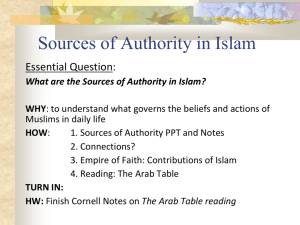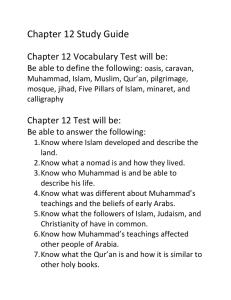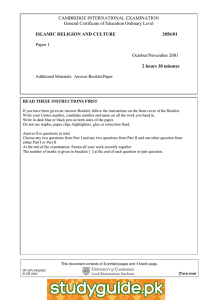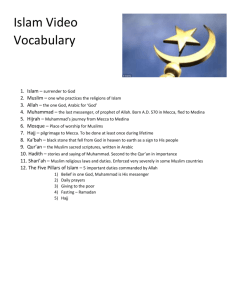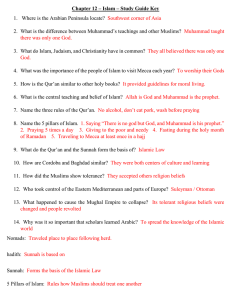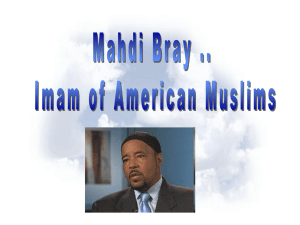33week8Islam.PPT
advertisement
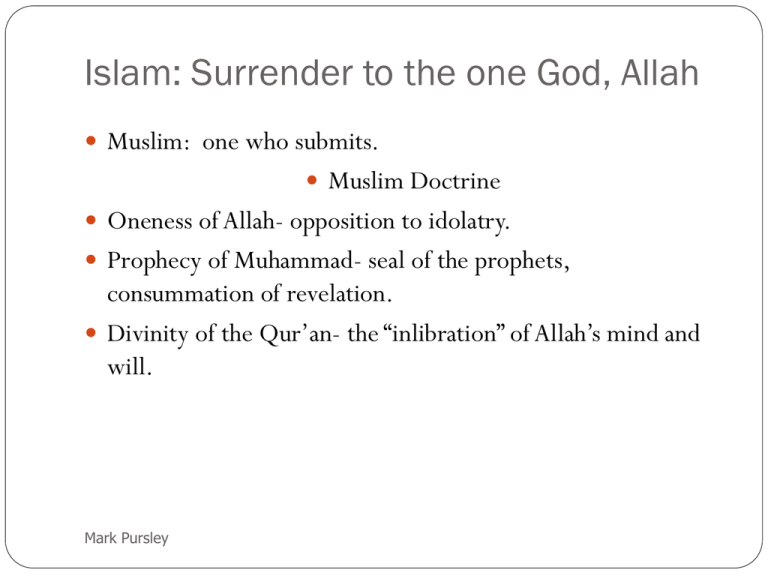
Islam: Surrender to the one God, Allah Muslim: one who submits. Muslim Doctrine Oneness of Allah- opposition to idolatry. Prophecy of Muhammad- seal of the prophets, consummation of revelation. Divinity of the Qur’an- the “inlibration” of Allah’s mind and will. Mark Pursley Muslim Doctrines Judgment Day: separation of believers and unbelievers, consignment to paradise or hell. Creation: Allah is the Lord of all worlds humans are vice-regents. Mark Pursley Ummah: brotherhood of believers. Hajj: Pilgrimage to Mecca as an experience of unity. Dar al Islam: “abode of submission,” lands and people under Islamic law. Dar alHarb: “abode of warfare,” nonMuslim peoples. Islamic Doctrine Angels: agents of God’s revelatory activity. Jinnhalfway between men and angels, created of fire. Some are beneficial, like guardian angels. Some are demons. Demon leader (Satan) is called Iblis. He was exiled from paradise for refusing to bow to Adam. Mark Pursley Predestination: God is sovereign. Fatalism or free will? In Shallah (if God wills it). He who wants the reward of this world, we give it to him, and he who wants the reward of the next world, we give it to him.(Sura 3/139). God leaves in error whom he will, and guides right whom he will. (Sura 74/34) The Qur'an (Koran) “Recitation,” “reading.” The unadulterated word of God which became audible through Muhammad, the pure vessel, in “clear Arabic language.” An eternal book which exists in heaven on a well-preserved tablet. Translation is impossible, will always contain interpretation. Contains solutions to all problems. Hidden mysteries await in the sequences of verses and arrangements of letters. revealed to Muhammad by the angel Gabriel in a series of revelations. 114 Suras. Meccan Suraswarnings, stories of the prophet. Medinian Suras- legal, practical issues. Mark Pursley Qur’an I will tell you what your Lord has made binding on you: that you shall serve no other gods besides Him; that you shall show kindness to your parents; that you shall not kill your children because you can’t support them...; that you shall not commit foul sins, whether openly or in secret; and that you shalt not killfor that is forbidden by God-except for a just cause. (Sura 6:150) Mark Pursley Men have authority over women because God has made the one superior to the other, and because they spend their wealth to maintain them. Good women are obedient.... As for those from whom you fear disobedience, admonish them and send them to beds apart and beat them. Then if they obey you, take no further action against them. (Sura 4:34) Ahl al-kitab Do not argue with the followers of earlier revelation otherwise than in the most kindly manner- unless it be such of them as are bent on evildoing- and say: “We believe in that which has been revealed to us from on high, as well as that which has been bestowed upon you: for our God and your God is one and the same, and it is unto him that we all surrender ourselves. 29.46 Mark Pursley The Satanic Verses In an apparent attempt to soften the harsh reaction his monotheistic message received, the prophet said: Have you not considered al-Lat and al-Uzza and Manat, the third other? These are the exalted birds whose intercession is approved. Later, these verses were removed and new verses were added dismissing the banat al-Llah as “mere names.” Mark Pursley Problem Passages? 41.12 Indicates that the earth was created before the sky and stars. 19.15ff Mary gives birth to Jesus- draws on the apocryphal book History of the Nativity of Mary and the Savior’s Infancy. 5.112 Jesus and the clay bird- from Infancy Gospel of Thomas Mark Pursley 9.5 When the sacred months are over slay the idolaters wherever you find them. 2.223 Women are your fields, go, then, into your fields whence you please. 9.69 God has promised unbelievers the fire of hell. The curse of God is upon them, lasting torment awaits. Salvation in Islam Human effort, not divine grace. All humans have a “sound constitution” (fitra). Conscience, natural beliefs about fairness and justice show we are created with a moral sense. No sacrifice or atonement is required, just repent and submit to Allah. Mark Pursley Deathbed conversion is not possible- a pattern of repentance and good works must be established, then God will forgive past unbelief and evildoing. Shirk: unforgivable sin “associating” something with god, idolatry and unbelief. War and Reward Jihad: “striving,” “holy war,” resisting evil individually and collectively. Greater jihadstriving against the lower self, internal struggle between right and wrong, truth and error. Lesser jihad- striving to protect the way of God against the forces of evil. Mark Pursley Mujahid: fighter in the path of God, values the path of God above all else, goes straight to paradise if killed. Paradise: Beautiful garden with flowing water and shade, maidens serve wine. Hell: hot wind, smoke, brackish water. Islam’s Exclusivism 5.49 Vie with each other in good works, for to God you shall all return and he will resolve for you your differences. 2.256 There shall be no compulsion in religion. 5.51 Believers, do not take Jews or Christians as friends. They are but one another’s friends. If anyone of you takes them for his friends, then he is surely one of them. God will not guide unbelievers. 9.5 Kill those who join other gods with God wherever you may find them. 8.12 I will instill terror in the hearts of the infidels, strike off their heads then, and strike off from them every fingertip. Mark Pursley Islamic Ethics Sharia: imam- things to be believed; islam- things to be done (works). Five Pillars: (1) Confession: There is no god but God and Muhammad is his messenger. (2) Prayer- ritual prayer five times a day. (3) Almsgiving: charity for the needy. (4) Fasting during Ramadan, no food or water, sunrise to sunset. (5) Pilgrimage to Mecca (once, if possible). Mark Pursley Islamic History Age of ignorance: Arabia before Muhammadpolytheism with an unapproachable high god known as Allah (the god). Animism- spirits in nature, demonic jinn, corpse eating ghouls. Ignorance of the original monotheism of Adam and Abraham. Mark Pursley Muhammad- 570 C.E. Father dies before his birth, Mother dies when he is two. Raised by Uncle Abu-Talib. Works on a caravan, illiterate. At age 25 marries wealthy widow Khadija who is 40. 2 sons die in infancy, 4 daughters, only one (Fatima) outlives Muhammad. History of Islam At age 40, in the month of Ramadan, in a cave on Mt. Hira, Muhammad receives his first revelation. Considers himself the last in a series of monotheistic prophets. First convert- Khadija, then cousin Ali, then pal Abu-Bakr. Is persecuted by Meccans. 619-Wife and Uncle die. 622- 9/24- Hijrah to Medina. 623- Marries Aisha, nine year old daughter of Abu-Bakr. 630Mecca conquered, idols destroyed at the Kaaba. Further marriages. 632- dies. Mark Pursley Sunnah vs Shiah After Muhammad’s death, his close friend Abu Bakr was elected successor (kalipha). Some felt that the successor should have been Ali ibn Abi Talib, the prophet’s cousin and son-in-law (who became the fourth caliph). Mark Pursley Dissidents, who disapproved of the policies of the first three caliphs (abu Bakr, Umar ibn al-Khattab, and Uthman ibn Affan), claimed that Ali was the first rightful Imam. This group, the Shiah-i-Ali (partisans of Ali) split from the Sunnah. Islamic Mysticism: Sufism The Sufis attempted to return to the original simplicity of the ummah when all Muslims lived as equals. Many wore the course wool garment (tasawwuf) common among the poor as Muhammad had done. Reacting against legalism and literalism, the Sufis sought to cultivate the state of mind that enabled the prophet to hear God’s message. Fasting, vigils, and chanting the names of God would sometimes induce ecstatic states. By peeling away the layers of egoism, some found Allah as the ground of their own being. I am through thee, there is no god but thou. (Abu Yazid alBistami). Mark Pursley The Quranic Portrait of Jesus The Qur’an insists that Jesus was a prophet in the succession of Noah, Abraham, and Moses. Jesus provided “clear signs” and recruited “helpers to God.” Mark Pursley His later followers divided into “sects” and “fell into disagreement.” They corrupted Jesus’ message creating such innovations as ”monasticism” and “trinity.” He was simply a messenger and “never said worship me and my mother.” The Historical Critical Method (HCM) and Islam The HCM, which biblical scholars have applied to the Hebrew scriptures and the New Testament, has not been widely employed by Muslim scholars. Those who have used critical scholarship in interpreting the Qur’an have concluded the following: Mark Pursley The Qur’an makes use of extant Jewish and Christian stories, adapting them to its message. The Qur’an addresses Muhammad’s audience in a particular place and time, which influences how the message applies in different circumstances. The Qur’an’s message is closely connected with the personality of the Prophet. Islamic Scholars In, The Spirit of Islam, Sayyed Amir Ali argues that the Qur’an contains Muhammad’s teachings which evolved over time. The “realistic” descriptions of heaven and hell are from the early period “before the mind of the teacher had attained the full development of religious consciousness….[T]he adoration of God in humility and love.” Sayyed Amir Ali 1849- 1928 Mark Pursley Islamic Scholarship Asaf Fyzee (1899- 1981) Fazlur Rahman (19121988) According to Asaf Fyzee, Rahman claims that the the Qur’an is God’s voice as heard by the Prophet. It is “a testimony of his faith in God.” God does not speak directly, but Muhammad’s words and God’s words are one in a mysterious way. Mark Pursley Qur’an “had partly to accept the then existing society as a point of reference” so its laws cannot be viewed as “literally eternal.” “The Qur’an is entirely the word of God” and “also entirely the word of Muhammad.” Irshad Manji In ,The Trouble With Islam Today, journalist Irshad Manji calls for a reformation in Islam which she refers to as Project Ijtihad. Ijtihad is a term from early Muslim theology which means “independently forming one’s own opinion. She hopes to revive “Islam’s lost tradition of independent thinking….To this very day, imitation of medieval norms has trumped innovation in Islam. It’s time to revive ijtihad to update Islam for the twenty-first century.” The Qur’an, she says, should be viewed as “divinely inspired” rather than “divinely authored.” The history of its compilation “points to the probability of human editing and therefore human error.” Mark Pursley Ijtihad Even moderate Muslims believe that the Qur’an is the final, immutable word of God, untouched by the human hand and mind.Which is why most Muslims have no clue how to debate or dissent with extremists—we’ve never been introduced to the possibility, let alone the virtue, of asking questions of our holy book. Mark Pursley It’s time to change that…Mainstream Muslims need to face those questions, just as moderates in Christianity and Judaism have been doing for the past century. www.irshadmanji.com Interfaith Dialogue Whilst Islam and Christianity are obviously different religions- and whilst there is no minimising some of their formal differences- it is clear that the Two Greatest Commandments are an area of common ground and a link between the Qur’an, the Torah, and the New Testament…So let our differences not cause hatred and strife between us. Let us vie with each other in righteousness and good works. Let us respect each other, be fair, just and kind to one another and live in sincere peace, harmony and mutual goodwill. A Common Word Between You and Us 10/13/06 http://www.acommonword.com/index.php?lang=en&page=option1 Mark Pursley References Ali, A.Y. (Translator). (2009). The Qur’an: a guide and mercy. Elmhurst, New York: Tahrike Tarsile Qur’an Inc. Armstrong, K. (1992). Muhammad: A biography of the prophet. San Francisco: Harper Collins. Armstrong, K. (2000). Islam: a short history. New York: Random House. Dawood, N.J. (Translator). (1993). The koran. New York: Penguin. Mark Pursley References Denny, F.M. (1987). Islam. New York: Harper & Row. Manji, I. (2003). The trouble with Islam today. New York: St. Martin’s Griffen. Warraq, I. (2003). Why I am not a Muslim. Amherst, New York: Prometheus Books. Williams, J.A. (1962). Islam. New York: George Braziller. Mark Pursley


